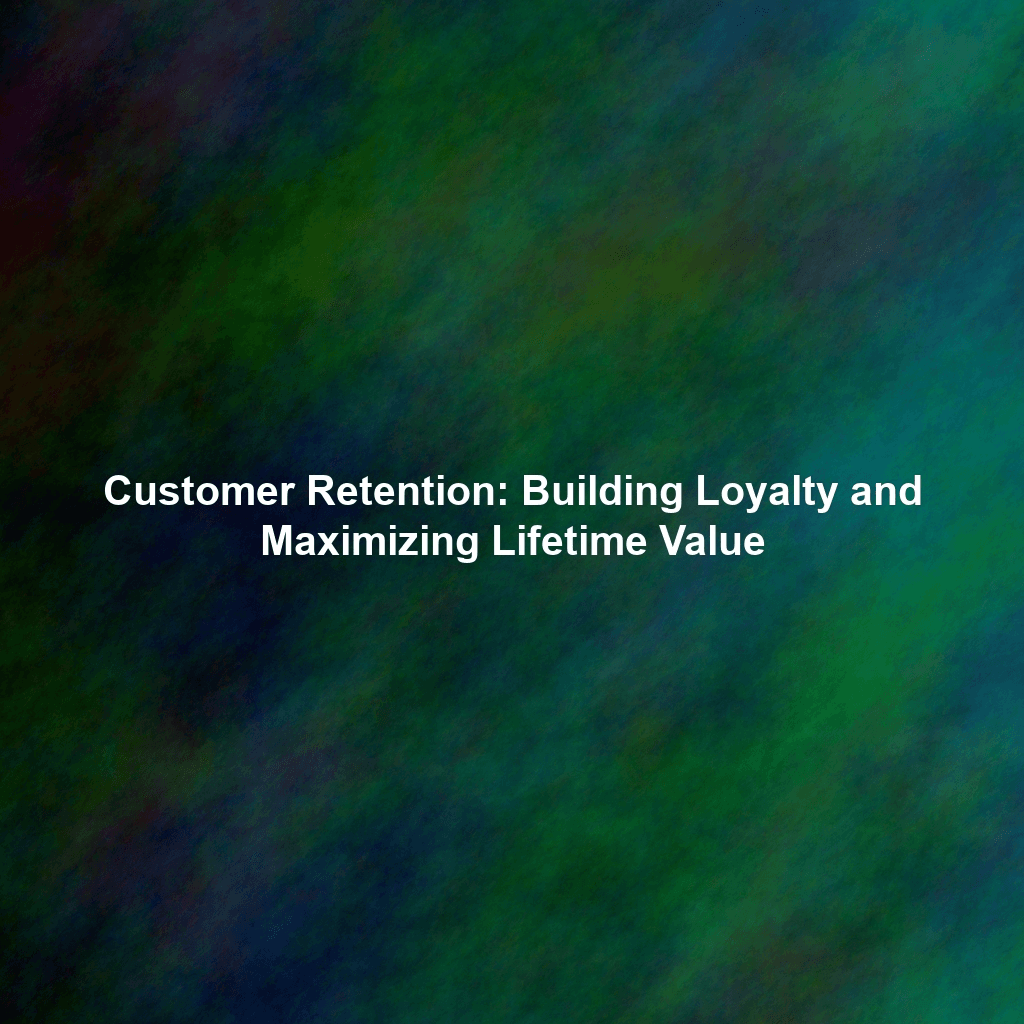The Undervalued Powerhouse: Customer Retention in Your Marketing Funnel
Why Customer Retention Matters More Than You Think
The benefits of focusing on customer retention are numerous and significant:
- Increased Profitability: Studies consistently show that it costs significantly less to retain an existing customer than to acquire a new one. Some estimates suggest it can cost five times more! Increased retention directly translates to higher profit margins.
- Higher Customer Lifetime Value (CLTV): Loyal customers spend more over time. They are also more likely to purchase higher-priced items or services. CLTV, the total revenue a single customer is expected to generate throughout their relationship with your business, is a key metric driven by retention.
- Reduced Churn Rate: Customer churn, the rate at which customers stop doing business with your company, is a critical indicator of customer satisfaction and overall business health. Effective retention strategies directly combat churn.
- Positive Word-of-Mouth Marketing: Satisfied, loyal customers are your best brand ambassadors. They’re more likely to recommend your business to friends, family, and colleagues, providing invaluable (and free!) word-of-mouth marketing.
- Feedback and Innovation: Loyal customers are a valuable source of feedback, helping you improve your products, services, and overall customer experience. They’re invested in your success and often willing to share their insights.
- Resilience in Competitive Markets: In highly competitive markets, strong customer relationships can provide a crucial competitive advantage. Loyal customers are less likely to be swayed by competitors’ offers.
Customer Retention and the Marketing Funnel: Completing the Cycle
While the marketing funnel is often depicted as a linear process (Awareness, Interest, Consideration, Conversion, and Advocacy), it’s more accurate to think of it as a cycle. Customer retention sits firmly at the advocacy stage, ensuring that newly acquired customers don’t simply funnel out after their first purchase. Instead, retention efforts aim to loop them back into the funnel, fostering loyalty and encouraging repeat purchases. A well-designed retention strategy acknowledges the importance of a continuous loop, ensuring that the funnel is constantly being fed by satisfied, returning customers. Consider adding ‘Retention’ as an explicit stage in your funnel visualization.
Key Strategies for Building Customer Loyalty and Boosting Retention
So, how do you effectively cultivate customer loyalty and improve your retention rates? Here’s a breakdown of proven strategies:
1. Deliver Exceptional Customer Service
This is the foundation of any successful retention strategy. Go above and beyond to provide prompt, helpful, and personalized support. Train your team to empathize with customers and resolve issues efficiently. Implement multiple support channels (phone, email, chat, social media) to cater to different customer preferences. Actively seek feedback and use it to improve your service. Remember, every interaction is an opportunity to build or erode trust.
2. Personalize the Customer Experience
Customers today expect personalized experiences. Use data to understand their individual needs, preferences, and purchase history. Tailor your marketing messages, product recommendations, and even your website content to their specific interests. Segment your audience to create more targeted and relevant communications. Personalization shows customers that you value them as individuals, not just another transaction.
3. Implement a Loyalty Program
Loyalty programs incentivize repeat purchases and reward customers for their continued business. Offer points, discounts, exclusive access to products or services, or other perks that are relevant to your target audience. Make sure your program is easy to understand and participate in. Promote it effectively and track its performance to ensure it’s driving the desired results.
4. Build a Strong Community
Foster a sense of community around your brand by creating forums, groups, or events where customers can connect with each other and with your company. Encourage engagement and conversation. Provide valuable content and resources. A strong community creates a sense of belonging and loyalty, making customers feel more connected to your brand.
5. Provide Valuable Content
Content marketing isn’t just for attracting new customers; it’s also a powerful retention tool. Create valuable and informative content that addresses your existing customers’ needs and interests. This could include blog posts, articles, videos, ebooks, webinars, or podcasts. Providing helpful content demonstrates your expertise and keeps your brand top-of-mind.
6. Seek and Act on Feedback
Actively solicit feedback from your customers through surveys, feedback forms, or social media monitoring. Pay close attention to what they’re saying and use their feedback to improve your products, services, and processes. Demonstrate that you value their opinions and are committed to providing the best possible experience. Don’t just collect the feedback; actively communicate what changes you are making based on it.
7. Proactive Customer Engagement
Don’t wait for customers to contact you with problems. Proactively reach out to them to check in, offer assistance, or provide helpful tips. This shows that you care about their success and are invested in their relationship with your business. Consider sending personalized birthday messages or anniversary discounts to show appreciation.
8. Surprise and Delight
Unexpected gestures of goodwill can go a long way in building customer loyalty. Surprise your customers with a free gift, a handwritten note, or a special discount. These small gestures can create a lasting positive impression and strengthen your relationship.
9. Address Negative Feedback Quickly and Effectively
Negative feedback is inevitable. The key is to address it quickly and effectively. Respond to complaints promptly and professionally. Apologize for any inconvenience and work to resolve the issue to the customer’s satisfaction. Turning a negative experience into a positive one can often strengthen customer loyalty.
10. Monitor and Analyze Your Retention Metrics
Regularly track and analyze key retention metrics, such as churn rate, customer lifetime value, and customer satisfaction scores. This data will help you identify areas where you can improve your retention efforts and measure the effectiveness of your strategies. Without data, you’re flying blind.
Measuring Your Customer Retention Success: Key Metrics to Track
Knowing your retention rate is crucial, but to truly understand the health of your customer relationships, track these key metrics:
- Churn Rate: The percentage of customers who leave your business over a specific period. A lower churn rate is always the goal.
- Customer Lifetime Value (CLTV): The total revenue you expect to generate from a single customer throughout their relationship with your business. Higher CLTV indicates stronger customer loyalty.
- Customer Retention Rate: The percentage of customers who remain customers over a specific period.
- Net Promoter Score (NPS): A metric that measures customer loyalty and willingness to recommend your business to others.
- Customer Satisfaction (CSAT) Score: A metric that measures how satisfied customers are with your products, services, or interactions.
The Long-Term Game: Investing in Customer Relationships
Customer retention isn’t a quick fix; it’s a long-term strategy that requires consistent effort and investment. By prioritizing customer loyalty and providing exceptional experiences, you can build a thriving business with a loyal customer base that generates sustainable growth. Don’t underestimate the power of your existing customers. They are the foundation of your success.
Beyond the Transaction: Building Relationships, Not Just Customers
In today’s competitive landscape, customers are not simply looking for products or services; they are seeking experiences and relationships. By focusing on building genuine connections with your customers, you can create a sense of loyalty that transcends mere transactions. This means understanding their needs, anticipating their challenges, and providing solutions that go beyond their expectations. It’s about creating a partnership where both parties benefit and thrive. When customers feel valued and appreciated, they are more likely to remain loyal and become advocates for your brand.
Conclusion: Retention is the New Acquisition
While acquiring new customers is essential for growth, neglecting customer retention is like pouring water into a leaky bucket. By prioritizing customer loyalty and implementing effective retention strategies, you can maximize customer lifetime value, reduce churn, and build a sustainable business. Remember, your existing customers are your most valuable asset. Invest in them, nurture them, and they will reward you with their loyalty and advocacy. It’s time to shift the focus from solely acquiring new customers to cultivating the relationships you already have. Your bottom line will thank you.
 Skip to content
Skip to content

